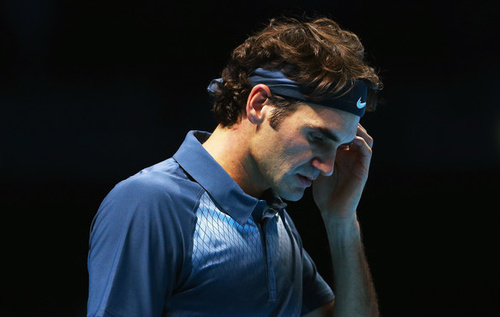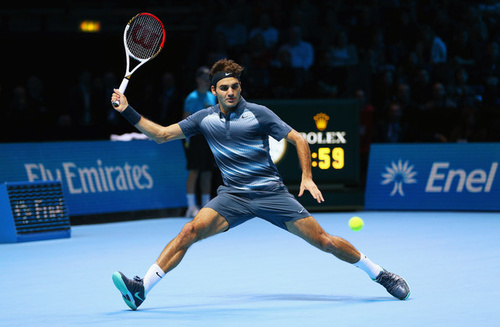Don't miss any stories → Follow Tennis View
FollowATP Predictions for 2014 (Part I): Federer Falls
During this offseason, columnist Matt Tewhatu will offer a series of predictions on what to expect in the ATP next season.
Matt's First Prediction: “Roger Federer will fall outside of the ATP top 10 for the first time in 11 years and fail to win a singles title in 2014.”

What goes up must come down.
No phrase is more disappointingly relevant than to the once-indestructible Roger Federer. His accuracy and his controlled flamboyance saw him rise to the pinnacle of tennis, while his suave and personable demeanor saw him ascend as one of the most popular and iconic personalities on the planet. Despite the support that Federer continues to draw from crowds around the world, however, a long and arduous 2013 has not been kind to the Swiss maestro as he battles age and his wearing body. As Federer looks to the off-season to help recover from the back problems that hampered his 2013 season, one cannot turn a blind eye to the fact that the rest of the world’s top 10 have advanced to a higher level than he has occupied since a loss to Tsonga at Roland Garros in June.
It is a narrative with which we are all too familiar. Pete Sampras and Andre Agassi are perhaps the most notable greats in the past decade who announced their retirements after battling age and a new up-and-coming group of challengers, Federer among them. Sampras retired within a year of his last major title after falling to world No. 34, a great surprise considering his stranglehold on the world No. 1 ranking only years earlier. In contrast, Agassi held on much longer than Sampras but succumbed to a persistent back injury and retired at Flushing Meadows in 2006, three years after surrendering the No. 1 ranking. Roger Federer’s story is becoming eerily similar to those who have gone before him. He is now finding that he cannot consistently physically compete with his leading rivals, an issue that will continue to plague him from here forward.
A number of battles face Federer as he heads into the off-season, of which the widening chasm between him and the rest of the top 10 is among the most significant. This chasm has not been more noticeable than in his matches against opponents in the top 10 this year. The statistics portray a player on a steep decline, especially between 2012 and 2013.
In 2010, Federer had a 16-6 win-loss record against players in the top 10, which works out to a 72% success rate. In 2011, his win-loss record fell slightly to 15-10, or 60% against players in the top 10, but he slightly improved that record in 2012 to 64% and a win-loss record of 16-9. In 2013, however, his win-loss record against players in the top 10 has dropped to 3-10, or 23%. Granted, Federer played fewer tournaments and fewer matches overall in 2013. The win-loss record reveals a number of features in Federer’s decline. Clearly, it shows that he is no longer able to win big matches against players in the ATP top 10. But it also shows that he has not gone as far into elite tournaments, which means that he is getting fewer opportunities to face players in the top five. For example, Federer lost to two players outside the top 20 (Sergiy Stakhovsky and Tommy Robredo) at his last two majors.
One notable change in Federer’s game has been his inability to win the big points against the big players. For most of the past decade, Federer managed to play himself out of tough situations with his trademark t-serve and his once-majestic footwork. While his service percentage has not fallen dramatically over the years, his declining execution of what once was his ‘bread and butter’ on the clutch points has translated to poor results.

There has also been a considerable decline in Federer’s footwork in the past 12 months. His footwork on the court once set him apart from the rest, but he is now often struggling to recover from defensive positions, particularly on the forehand wing when the ball is hit ‘behind’ his forehand. Although his performance improved in his last three tournaments of the year, he lacked the physical intensity to string together long sequences of his best tennis against other players in the top 10.
Moreover, Federer’s self-belief and confidence also will be put to the test. Motivation is a question that is often thrown around when players like Federer move into the twilight of their career, and it is indeed a valid question. Self-belief in a player’s game is said to be the gap between the very best and the rest. While there is no question that Federer’s game—at its best—possesses the tools to reach the top again, a dismal season and an aging body place doubt in even the strongest player’s minds, especially when there are no more records or accolades to achieve. While Federer maintains that he still enjoys the game and possesses the drive to play his best tennis, one wonders how long this will remain true as adversity mounts with time.
Nevertheless, Federer still believes that he currently belongs in the world’s best, and anyone would be foolish to bet against a player who has spent an astonishing 11 years inside the top 10. But it seems now only a matter of time before time catches up with him for good on both physical and mental levels.










